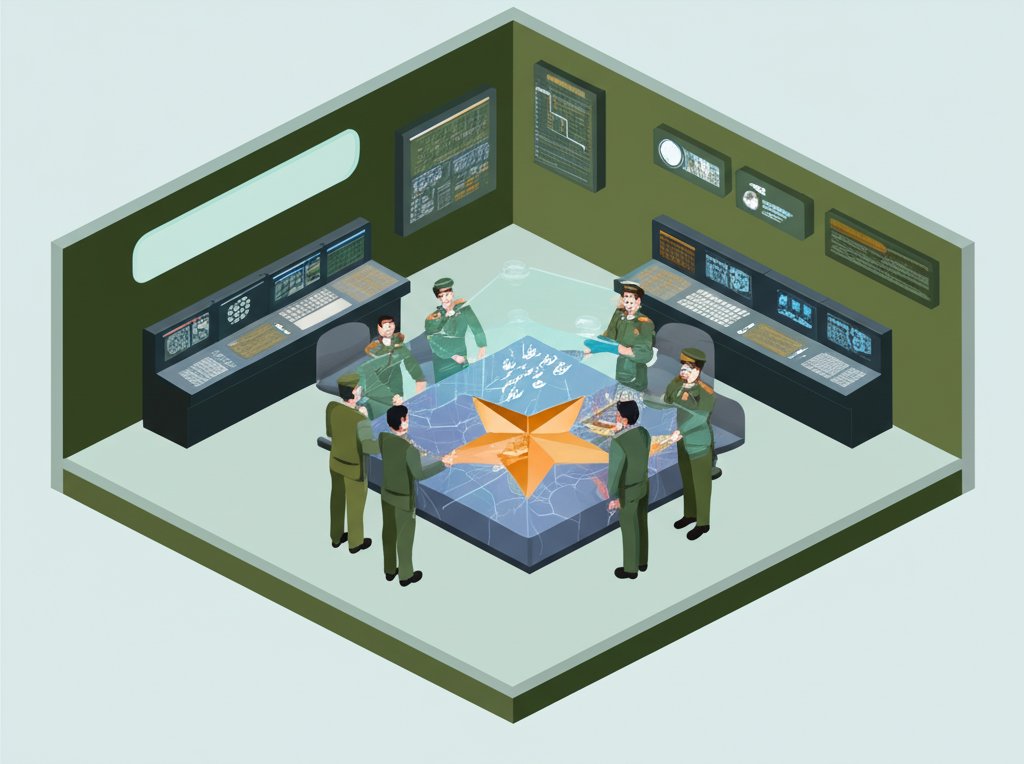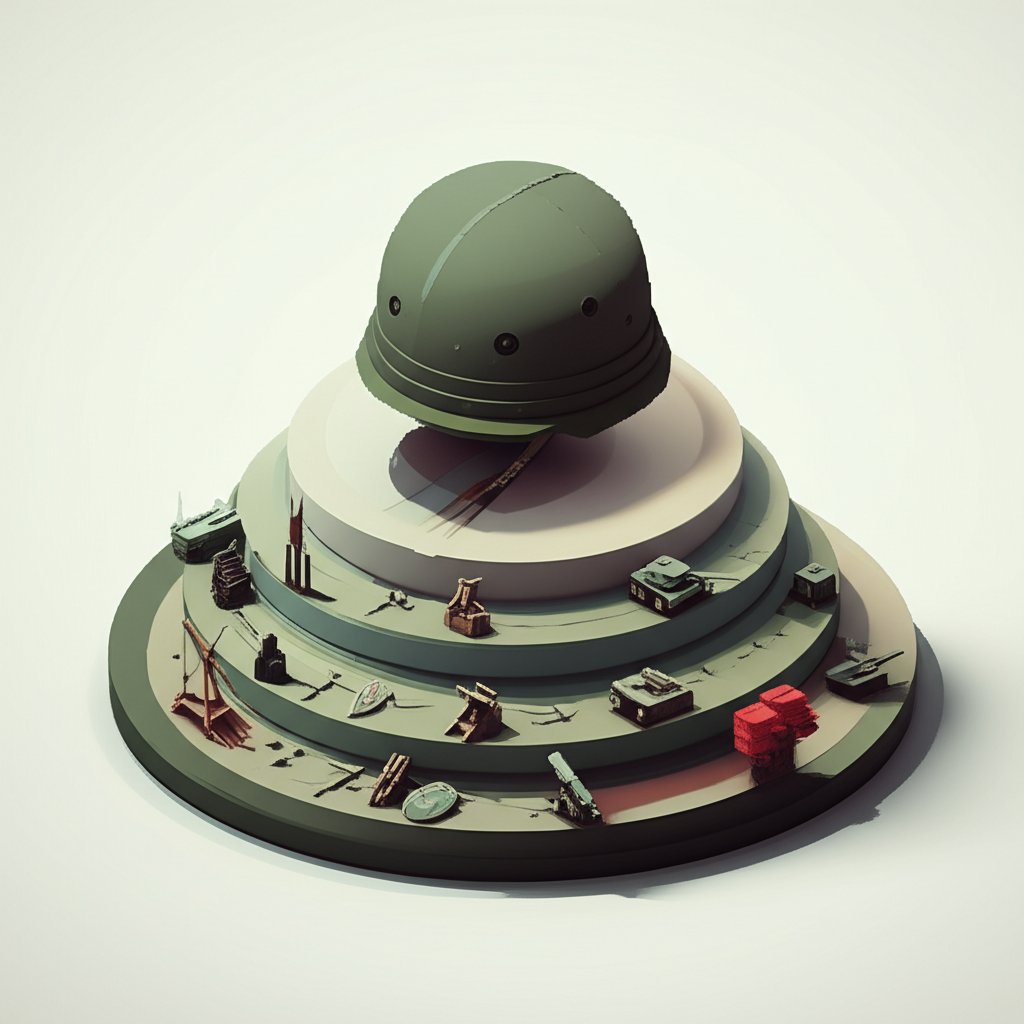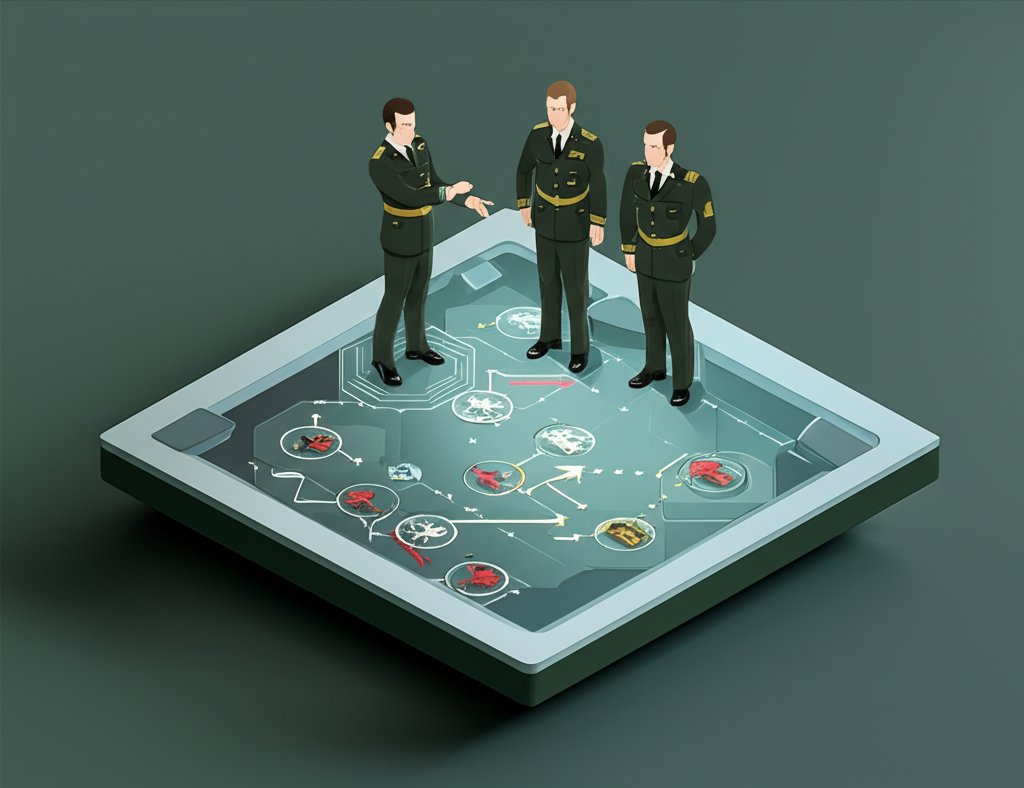Step onto the grand stage of history, where the clash of empires and the fate of nations were decided by the extraordinary minds of men. From the dawn of civilization to the modern era, legendary military commanders have emerged as the architects of victory, their strategic genius and unwavering leadership forever altering the history of warfare. These aren’t just figures in old books; they are the ultimate masters of war tactics, whose every decision, every maneuver, and every battle plan resonate through the military history of humanity.
In this exhaustive exploration, we will delve into the lives and campaigns of the most famous generals to ever command an army. We’ll uncover the specific warfare tactics they employed, analyze their triumphs and occasional setbacks, and understand the profound legacies they left behind. Prepare to journey through millennia of conflict, witnessing how these military titans shaped not only battlefields but also the very course of civilization.
The Enduring Legacy of Legendary Military Commanders
The allure of military commanders stretches far beyond the battlefield. These individuals were often nation-builders, political strategists, and cultural icons, whose influence extended into every facet of their societies. Their ability to inspire loyalty, instill discipline, and devise cunning plans transformed chaotic skirmishes into decisive victories, leading to the rise and fall of empires. Understanding these famous generals isn’t merely about appreciating historical figures; it’s about grasping the very essence of leadership, strategy, and human ingenuity under immense pressure.
Their stories form the bedrock of military history, offering invaluable lessons in logistics, psychology, and the art of command. They prove that while technology and resources are vital, the human element – the mind of a brilliant commander – often tips the scales of destiny.
To truly appreciate the impact of these strategists, it’s essential to examine the landmark battles that defined their careers, offering a glimpse into what made these figures iconic military leaders.
A Deep Dive into the History of Warfare: From Ancient Phalanxes to Modern Blitzkrieg
The history of warfare is a dynamic tapestry woven with threads of innovation, adaptation, and destruction. From rudimentary tribal clashes to highly organized conflicts, each era introduced new challenges and necessitated revolutionary warfare tactics.
In ancient times, the focus was often on massed infantry formations, individual valor, and the direct confrontation of forces. The Greek phalanx, the Roman legion, and the Persian cavalry represented the pinnacle of organized violence. As empires expanded, so did the scale of conflict, pushing commanders to master logistics, supply lines, and siege warfare.
The medieval period saw the rise of armored knights, castles, and the complex feudal system influencing troop recruitment and deployment. The invention of gunpowder then fundamentally reshaped battlefields, leading to the gradual decline of cavalry charges and castle defenses, and ushering in an era where artillery and firearms became dominant.
The Enlightenment brought about more professional armies, standardized training, and grander strategic maneuvers, culminating in the Napoleonic Wars, which demonstrated the power of mass conscription and rapid, decisive campaigns. The 20th century, with its world wars, witnessed an unprecedented escalation in technology, from tanks and aircraft to submarines and atomic weapons. Blitzkrieg, trench warfare, and combined arms operations became critical warfare tactics. The modern age continues this evolution with cyber warfare, drone technology, and asymmetric conflicts, showcasing an ever-changing landscape where the ingenuity of military commanders remains paramount.
Pioneering Warfare Tactics: Strategies That Changed the Battlefield
The greatest military commanders weren’t content with conventional approaches; they were innovators who dared to rethink the rules of engagement, creating warfare tactics that gave them decisive advantages. These tactics often involved:
- Deception and Misdirection: Feigning retreats, creating diversions, or using false intelligence to lure enemies into traps.
- Maneuver Warfare: Emphasizing speed, surprise, and flanking movements to bypass enemy strong points and strike at their weaknesses or rear.
- Logistical Masterpieces: Organizing supply lines, troop movements, and communications across vast distances or hostile terrain.
- Psychological Warfare: Undermining enemy morale through intimidation, propaganda, or calculated displays of force.
- Combined Arms Integration: Effectively coordinating different branches of the military (infantry, cavalry, artillery, air force) to achieve synergistic effects.
- Adaptability: The ability to change plans mid-battle in response to unforeseen circumstances, turning potential defeat into victory.
From Hannibal Barca’s double envelopment at Cannae to Genghis Khan’s lightning cavalry raids and the psychological impact of Sun Tzu’s teachings, these tactical innovations repeatedly redefined the art of war, making these famous generals legendary.
Iconic Military Commanders and Their Masterful Strategies

Let’s delve deeper into the lives and campaigns of some of the most influential military commanders of all time, exploring the warfare tactics that cemented their places in military history.
Alexander the Great: The Architect of Empires
Alexander III of Macedon (356–323 BCE), known as Alexander the Great, built an empire stretching from Greece to India in just over a decade, remaining undefeated in battle. His genius lay in his aggressive leadership, his innovative use of the Macedonian phalanx in conjunction with highly disciplined companion cavalry, and his ability to inspire unwavering loyalty. His campaigns, such as the Battle of Gaugamela against Darius III of Persia, showcased his mastery of complex maneuvers, using feints and decisive charges to dismantle far larger armies. Alexander didn’t just conquer; he absorbed and assimilated cultures, leaving a Hellenistic legacy that profoundly shaped subsequent civilizations. His rapid campaigns and tactical brilliance remain a cornerstone of military history studies.
Sun Tzu: The Philosopher of War and Deception
Though his existence is debated, the name Sun Tzu remains synonymous with strategic brilliance. His seminal work, The Art of War, written around the 5th century BCE, is arguably the most influential treatise on warfare tactics ever penned. Sun Tzu emphasized the importance of intelligence, deception, avoiding protracted conflict, and understanding both oneself and the enemy. “To win one hundred victories in one hundred battles is not the acme of skill. To subdue the enemy without fighting is the acme of skill.” This philosophy highlights a focus on psychological warfare and strategic positioning over brute force, a timeless lesson for military commanders across millennia. His insights continue to be studied by business leaders and military strategists alike.
Hannibal Barca: The Master of Maneuver
Hannibal Barca (247–183/181 BCE), the Carthaginian general, is revered for his audacious crossing of the Alps with elephants and his remarkable victories against Rome during the Second Punic War. His tactical masterpiece, the Battle of Cannae (216 BCE), stands as one of history’s most brilliant examples of a double envelopment. There, Hannibal allowed his center to apparently collapse, drawing the superior Roman legions deep into his lines, only to have his cavalry and flanking infantry close in, annihilating the enemy. His cunning, psychological warfare, and ability to adapt to enemy strengths illustrate a profound understanding of warfare tactics that continues to influence modern military thinking.
Julius Caesar: The Indomitable Roman
Gaius Julius Caesar (100–44 BCE) was a Roman general and statesman whose campaigns fundamentally transformed the Roman Republic into an empire. His conquest of Gaul, chronicled in his Commentarii de Bello Gallico, showcased his exceptional leadership, engineering prowess (e.g., the siege of Alesia), and his innovative use of disciplined Roman legions. Caesar excelled at rapid marches, fortified camps, and adapting legionary formations to various terrains and enemy types. His warfare tactics often involved bold offensive actions, meticulous planning, and an uncanny ability to rally his troops, earning him a place among the most famous generals in military history.
Genghis Khan: The Scourge of God and Unifier
Temüjin, better known as Genghis Khan (c. 1162–1227), was the founder and first Great Khan of the Mongol Empire, which became the largest contiguous empire in history of warfare. His success was built on unifying disparate nomadic tribes and unleashing a superbly disciplined, highly mobile cavalry force. Genghis Khan mastered psychological warfare, using terror tactics and feigned retreats to demoralize and disorganize opponents. His warfare tactics included sophisticated communication systems, rapid deployment, and devastating coordinated attacks, often employing envelopment and encirclement. He revolutionized the concept of blitzkrieg centuries before it was named, leaving a lasting mark on military history.
Saladin: The Sultan of Chivalry and Strategy
Salah ad-Din Yusuf ibn Ayyub (1137/1138–1193), known as Saladin, was the first sultan of Egypt and Syria and the founder of the Ayyubid dynasty. He led the Muslim military campaign against the Crusader states in the Levant. Saladin was a master of defensive and offensive campaigns, known for his patience, resilience, and strategic use of mobile cavalry. His greatest triumph, the Battle of Hattin (1187), saw him trap and decisively defeat the Crusader army, leading to the recapture of Jerusalem. Saladin’s tactical genius was matched by his reputation for chivalry and magnanimity, making him one of the most respected military commanders in history of warfare.
Napoleon Bonaparte: The Emperor of Innovation
Napoleon Bonaparte (1769–1821) revolutionized warfare tactics in the early 19th century, transforming European military history. As Emperor of the French, he created the Grande Armée, pioneering concepts like corps d’armée (dividing his army into self-sufficient units capable of independent action) and aggressive, rapid campaigns (Blitzkrieg prototypes). His tactical brilliance centered on concentrating overwhelming force at a decisive point, known as the manoeuvre sur les derrières, often achieved through lightning-fast marches and the effective use of massed artillery. Battles like Austerlitz and Jena became textbooks examples of his strategic genius, cementing his status as one of the most famous generals and influential military commanders.
Frederick the Great: The Father of Modern European Warfare
Frederick II of Prussia (1712–1786), known as Frederick the Great, inherited a small kingdom but transformed Prussia into a major European power through his military reforms and brilliant leadership. He professionalized the Prussian army, emphasizing strict discipline, rigorous training, and rapid maneuverability. His signature warfare tactic was the “oblique order” (Schlachtordnung), where he would refuse one flank and concentrate his forces on the other, outflanking and crushing the enemy. Victories at Rossbach and Leuthen during the Seven Years’ War showcased his daring and innovative approach, influencing subsequent European military commanders and earning him a prominent place in military history.
Erwin Rommel: The Desert Fox’s Audacious Moves
Erwin Rommel (1891–1944) was a German Field Marshal during World War II, famed for his leadership of the Afrika Korps in North Africa. Nicknamed the “Desert Fox,” Rommel was a master of maneuver warfare in desert terrain, often achieving surprising victories against numerically superior Allied forces. His warfare tactics relied on speed, deception, and aggressive use of tanks and combined arms to bypass enemy defenses and strike at their rear. His audacious drives and ability to adapt quickly to changing battlefield conditions made him a formidable and respected adversary, even among his enemies. His campaigns remain a captivating chapter in modern military history.
George S. Patton: The American Blitzkrieg Master
General George S. Patton Jr. (1885–1945) was one of the most colorful and effective military commanders of World War II. Known for his aggressive leadership and emphasis on speed, daring, and rapid armored thrusts, Patton epitomized the American spirit of offensive warfare. He commanded the U.S. Third Army, leading lightning-fast advances across France after D-Day, breaking through enemy lines, and famously relieving the besieged forces at Bastogne during the Battle of the Bulge. His insistence on pushing the attack, even when supplies were scarce, showcased a unique blend of tactical brilliance and psychological drive, solidifying his legacy as one of America’s most famous generals.
Zhukov: The Shield of Moscow and Conqueror of Berlin
Georgy Konstantinovich Zhukov (1896–1974) was a Soviet general and Marshal of the Soviet Union, widely considered one of the most decisive military commanders of World War II. He played crucial roles in virtually every major Soviet victory, from defending Moscow and Stalingrad to leading the final assault on Berlin. Zhukov was a master of large-scale operational planning, executing massive encirclement operations (like Operation Uranus at Stalingrad) and coordinating vast forces. His warfare tactics were characterized by deep battle theory, emphasizing multiple echelons of attack to overwhelm enemy defenses. His relentless determination and ability to manage unprecedented scale cemented his status as a titan in 20th-century military history.
Scipio Africanus: The Conqueror of Hannibal
Publius Cornelius Scipio Africanus (236–183 BCE) was the Roman general who ultimately defeated Hannibal Barca, widely considered one of the greatest military commanders in history of warfare. Scipio’s genius lay in his ability to learn from Hannibal’s own warfare tactics and adapt them. Instead of directly confronting Hannibal in Italy, Scipio took the war to Carthaginian territory in North Africa. His tactical brilliance shone at the Battle of Zama (202 BCE), where he devised a counter-strategy against Hannibal’s elephants and skillfully outmaneuvered the Carthaginian cavalry, securing a decisive Roman victory and ending the Second Punic War.
Charlemagne: The Father of Europe
Charlemagne (c. 747–814), King of the Franks and founder of the Carolingian Empire, was a powerful and influential military commander who significantly shaped medieval Europe. His numerous military campaigns unified much of Western Europe, laying the foundations for what would become France and Germany. Charlemagne’s warfare tactics involved well-organized armies, often featuring heavy cavalry, and a focus on swift, decisive campaigns against his Saxon, Lombard, and Avar adversaries. His ability to maintain a professional force and integrate conquered territories through administration and religious conversion made him a truly legendary figure, earning him the title “Father of Europe” in military history.
The Evolution of Military History: Lessons for Today’s Strategists
Studying these legendary military commanders provides more than just fascinating historical anecdotes; it offers timeless lessons that continue to resonate in contemporary strategy, whether in military conflicts, business, or everyday leadership. The core principles of effective warfare tactics—planning, adaptability, leadership, communication, and understanding one’s adversary—remain constant, even as the tools of war evolve.
From Alexander the Great’s audacious vision to Sun Tzu’s emphasis on psychological dominance, and Napoleon’s revolutionary logistics, the history of warfare is a rich repository of strategic wisdom. Modern famous generals still draw upon these foundational concepts, adapting them to the complexities of asymmetrical warfare, information-age conflicts, and geopolitical challenges. The deep insights gleaned from military history continue to inform and inspire, proving that while battlefields change, the essence of command endures.
Conclusion

The annals of military history are illuminated by the extraordinary brilliance of legendary military commanders. These famous generals were not merely leaders of men; they were strategic visionaries, tactical innovators, and masters of human psychology who fundamentally altered the course of empires and civilizations. Their warfare tactics, though forged in different eras and with distinct technologies, offer universal principles of strategy, leadership, and adaptability that continue to shape our understanding of conflict. As we reflect on their triumphs and legacies, we gain a deeper appreciation for the profound impact these masters of war tactics had on the history of warfare, reminding us that the human element remains the most potent force on any battlefield.
FAQ
Q1: Who are considered some of the most legendary military commanders in history?
A1: Some of the most legendary military commanders include Alexander the Great, Sun Tzu, Hannibal Barca, Julius Caesar, Genghis Khan, Saladin, Napoleon Bonaparte, Frederick the Great, Erwin Rommel, George S. Patton, and Georgy Zhukov.
Q2: What are some key warfare tactics introduced by famous generals?
A2: Key warfare tactics include Alexander the Great’s combined phalanx and cavalry charges, Hannibal’s double envelopment, Sun Tzu’s emphasis on deception and psychological warfare, Napoleon’s corps d’armée and concentrated artillery, and Frederick the Great’s oblique order.
Q3: How did military commanders influence the history of warfare?
A3: Military commanders profoundly influenced the history of warfare by introducing innovative strategies, developing new formations and technologies, shaping military doctrines, and demonstrating leadership that could inspire armies to achieve extraordinary feats, leading to the rise and fall of empires.
Q4: Why is studying military history important for understanding modern strategy?
A4: Studying military history is vital because it reveals timeless principles of strategy, psychology, logistics, and leadership that remain relevant in modern conflict and various other fields. It provides a rich database of successes and failures from which contemporary strategists can learn.
Q5: What distinguishes a “famous general” from an ordinary military leader?
A5: A famous general is distinguished by their exceptional strategic genius, consistent ability to achieve decisive victories against significant odds, profound impact on warfare tactics and military history, and an enduring legacy that influences subsequent generations of military thinkers and leaders.










